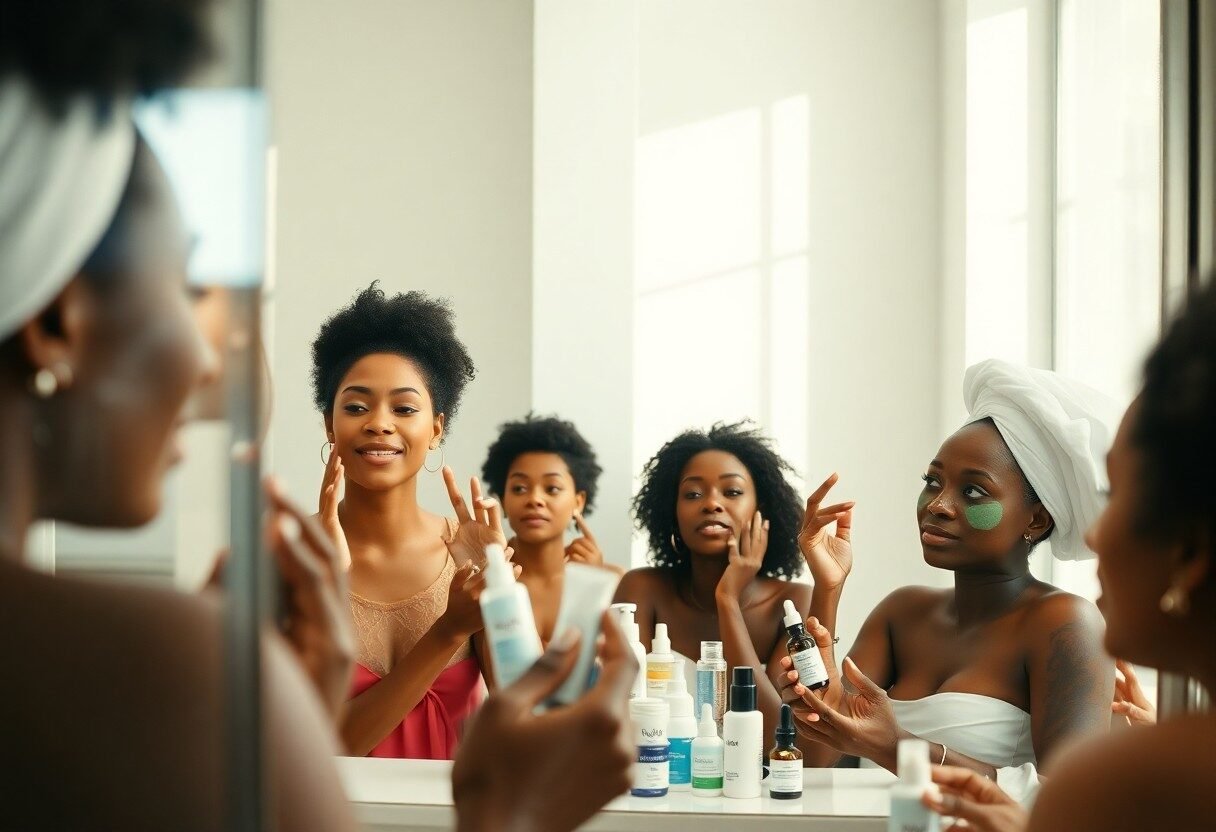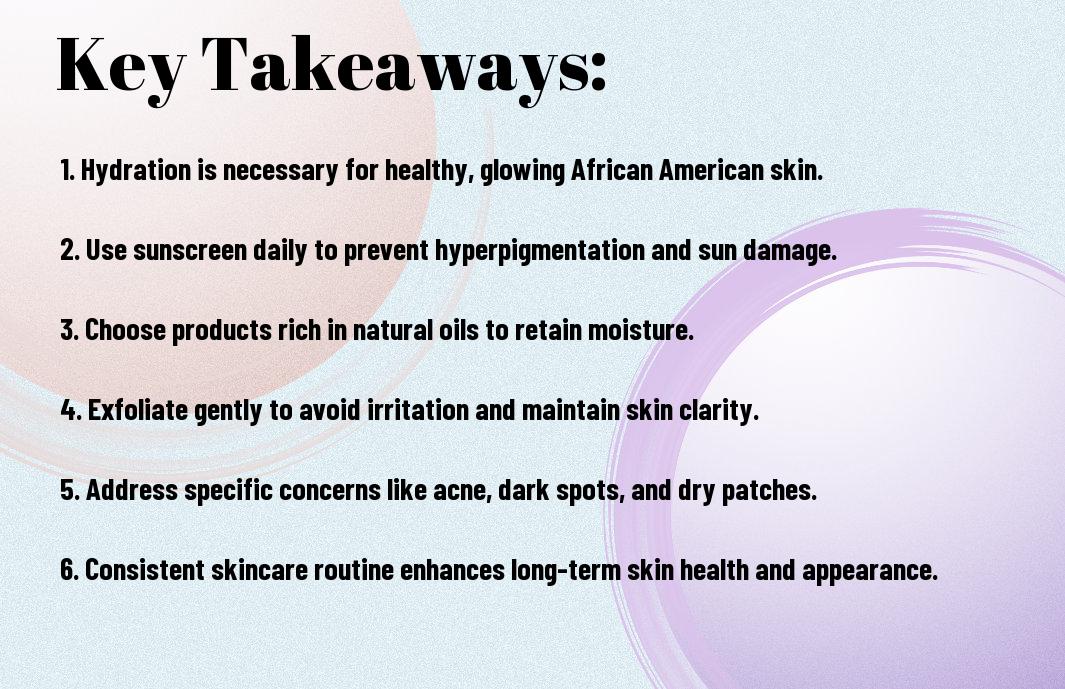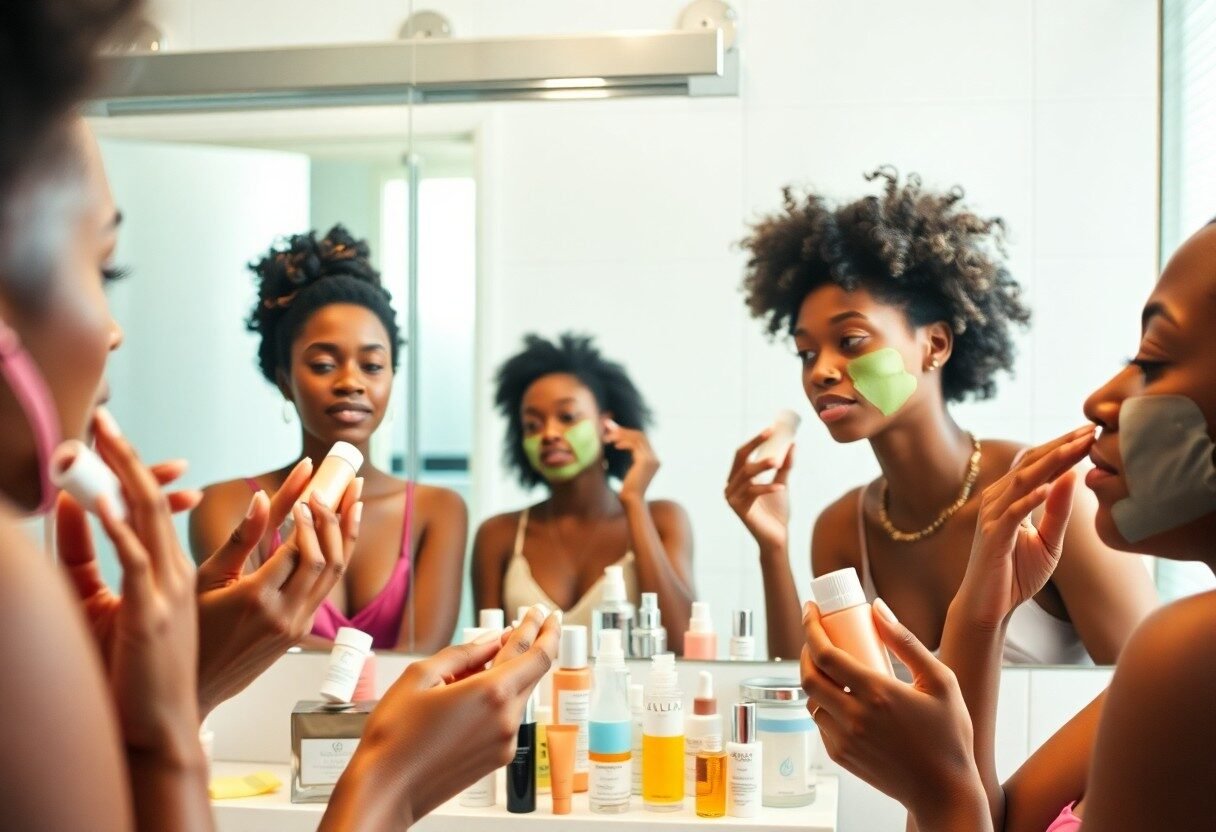
It’s crucial to understand that skincare for African American women requires specific attention to unique skin traits and common concerns. In this guide, I will share effective strategies tailored for your skin type, including moisturization, sun protection, and managing hyperpigmentation. You deserve a skincare routine that enhances your natural beauty while addressing the challenges that may arise. Join me as we explore the best practices to achieve and maintain healthy, radiant skin.
Key Takeaways:
- Understanding skin type is necessary; African American skin can vary from oily to dry, requiring tailored products.
- Regular exfoliation is beneficial for removing dead skin cells and promoting even skin tone, but choose gentle methods to avoid irritation.
- Moisturizing is vital; opt for products containing hyaluronic acid, shea butter, or glycerin to keep skin hydrated and supple.
- SPF protection should be a daily routine; darker skin can still experience sun damage, so a broad-spectrum sunscreen is important.
- Incorporating antioxidants, such as vitamin C, can help combat hyperpigmentation and promote a brighter complexion.
- Consider targeted treatments for common concerns like dark spots or uneven texture; serums and treatments can offer focused benefits.
- Skin care isn’t just about products; maintaining a balanced diet and hydration can have a significant impact on skin health.

Embracing Your Unique Skin Chemistry
Your skin reflects your heritage and personal history, making it vital to appreciate its unique chemistry. Embracing the distinct qualities of your skin can lead to better skincare choices tailored specifically for you. For African American women, understanding how factors like melanin levels, oil production, and moisture retention affect skincare can help you create a routine that not only enhances your natural beauty but also addresses your specific concerns, such as hyperpigmentation, dryness, and sensitivity.
The Role of Melanin in Skin Care
Melanin plays a pivotal role in safeguarding your skin from UV damage, giving it a natural protection that lighter skin tones lack. Higher melanin levels contribute to an improved barrier function, but they can also make conditions like hyperpigmentation more noticeable, especially after skin trauma. As a result, utilizing products with protective antioxidants and broad-spectrum SPF is crucial not just for prevention but also for correction.
Recognizing Specific Skin Characteristics
Identifying your skin type requires you to observe characteristics such as oiliness, dryness, and sensitivity. Many African American women experience a combination of skin types—areas of greasiness in the T-zone paired with dryness on the cheeks. You might notice enlarged pores, uneven skin tone, or more pronounced dark spots. Tailoring your routine to address these specific nuances allows you to cultivate healthier, more radiant skin.
By taking the time to assess your skin’s needs, the path to achieving an even and vibrant complexion becomes clearer. For example, if your T-zone tends to be oily but your cheeks are dry, a lightweight gel moisturizer can hydrate without overwhelming your skin. In addressing hyperpigmentation and uneven skin tone, exfoliating products with gentle AHAs or BHAs can help slough off dead skin cells, promoting a brighter overall appearance. Each characteristic signals what you must look for in your products and how you can nurture your skin effectively.
Tailored Ingredients: What Works Best?
Understanding which ingredients resonate best with your skin type can transform your skincare routine. For African American women, ingredients that combat dryness and enhance skin tone are important. Look for vitamin C for its brightening properties, salicylic acid for gentle exfoliation, and niacinamide to improve overall skin texture and moisture levels. Black women often have thicker skin with larger pores, so embracing lightweight formulations that penetrate deeply can make a substantial difference in maintaining a radiant complexion.
Hydrating Oils and Butters for Moisture Retention
Incorporating hydrating oils and butters like shea butter, jojoba oil, or coconut oil into your regimen is key for retaining moisture. These ingredients not only offer deep hydration but also create a protective barrier against environmental damage. I find that shea butter’s rich, creamy texture absorbs beautifully, preventing dryness without leaving a greasy residue. Essential fatty acids in these oils help lock in moisture, making them perfect for daily use on both face and body, especially in colder climates.
Natural Remedies for Hyperpigmentation
Hyperpigmentation can be a common concern, but natural remedies offer effective solutions. Ingredients such as aloe vera, licorice root extract, and turmeric have proven benefits in evening out skin tone by inhibiting melanin production. Utilizing aloe vera gel or turmeric masks can gradually lighten dark spots while soothing the skin. I often recommend introducing these remedies thoughtfully into your routine, watching for how your skin reacts to ensure the best results.
Exploring natural remedies for hyperpigmentation opens a host of options that are both gentle and effective. For instance, licorice root extract contains glabridin, which can fade dark spots without harsh side effects. Turmeric is known for its anti-inflammatory properties and has been used traditionally to treat uneven skin tones. Creating a DIY mask with turmeric and honey not only helps address pigmentation but also provides soothing effects. Gradually incorporating these natural remedies, I suggest testing patch areas to identify any allergies, ensuring a safe and beneficial approach to transformation.

Common Skin Concerns and Solutions
Addressing common skin concerns for African American women is crucial for achieving a healthy complexion. You may face issues like acne, hyperpigmentation, and uneven skin tone. Understanding the causes and solutions for these problems will empower you to create a tailored skincare routine that meets your unique needs. By incorporating the right products and habits, I can help you effectively manage these challenges while celebrating your beautiful skin.
Managing Acne-Prone Skin
For those of you with acne-prone skin, incorporating non-comedogenic products into your routine is key. Look for cleansers containing salicylic acid or benzoyl peroxide to combat breakouts while maintaining hydration. Regular exfoliation with gentle methods will help remove dead skin cells that may clog pores, allowing your skin to breathe and heal.
Tackling Dark Spots and Uneven Skin Tone
Dark spots and uneven skin tone are prevalent concerns that can affect your confidence. To effectively tackle this issue, focus on serums with vitamin C and niacinamide, as these ingredients are known for their brightening properties. Consistent use of sunscreen can also prevent further discoloration. Consider incorporating products with alpha hydroxy acids (AHAs) or retinoids to promote cell turnover and reveal a more even complexion.
When addressing dark spots and uneven skin tone, using a multi-faceted approach is key to success. Regularly applying a sunscreen with a high SPF protects your skin from harmful UV rays that can worsen pigmentation. In addition, incorporating products containing licorice extract and kojic acid may enhance your results by targeting melanin production directly. Lastly, adopting a consistent weekly exfoliation routine can facilitate new skin cell growth, helping to diminish the appearance of those stubborn dark spots over time.
Sun Protection: The Often Overlooked Essential
Sun protection is frequently underestimated in skincare routines for African American women, despite a misconception that melanin alone shields the skin from harmful UV rays. Incorporating effective sun protection not only prevents premature aging but also significantly reduces the risk of skin cancer, which affects darker skin tones just as seriously. A broad-spectrum sunscreen is imperative not only for maintaining an even skin tone but also for long-term skin health.
Importance of Broad-Spectrum Sunscreens
Broad-spectrum sunscreens protect against both UVA and UVB rays, providing comprehensive coverage for your skin. UVA rays penetrate deeply and are responsible for aging signs such as wrinkles, while UVB rays cause sunburn and contribute to skin cancers. Look for products with a minimum SPF of 30, as they block 97% of harmful rays, allowing you to enjoy outdoor activities without compromising your skin’s integrity.
Debunking Myths About Sunscreen for Darker Skin
Many believe that darker skin doesn’t need sunscreen, which leads to harmful practices and skin damage over time. The truth is, while melanin offers some degree of protection, it is not a substitute for sunscreen. According to the Skin Cancer Foundation, African American women can still suffer from skin cancers, though they may appear at later stages when survival rates drop significantly. The key factors are consistent application and selecting the right formulas that cater to your skin type.
Several myths about sunscreen persist among African American women, often stemming from the misconception that darker skin is naturally protected. In fact, while melanin does provide a level of defense against UV rays, it only offers an SPF equivalent of about 13, barely enough for effective protection. African Americans are still vulnerable to sun damage, leading to hyperpigmentation and other skin issues. Studies show that inclusive awareness about proper sun protection can significantly lower the incidence of skin cancer in darker-skinned individuals. Opt for a sunscreen that blends seamlessly with your skin tone and feel empowered to prioritize this imperative step for your beauty regimen.
Building Your Daily Regimen: Steps for Success
Creating a daily skincare regimen tailored specifically for your skin type requires a few consistent steps that can lead to significant results. Start by identifying your skin type and concerns, whether it’s hyperpigmentation, dryness, or acne. Follow a routine that includes cleansing, toning, moisturizing, and of course, applying sun protection during the daytime. Consistency will help you achieve the best outcomes, so dedicate a few minutes each morning and evening to nurture your skin, ensuring it remains healthy and radiant.
Essential Morning and Evening Routines
Your morning and evening skincare routines should focus on cleansing and hydration. In the morning, use a gentle cleanser to remove overnight oils and impurities, followed by a hydrating toner that preps your skin for other products. A lightweight moisturizer with SPF is crucial for day protection. In the evening, thoroughly cleanse your skin to remove makeup and dirt, apply a deeper-hydrating moisturizer or serum suited for nighttime use, and consider using a treatment for any specific skin concerns.
Making the Most of Exfoliation and Masks
Exfoliation and masks can be game-changers in your skincare regimen, helping to achieve that coveted glow. Gentle exfoliation 1-2 times a week can remove dead skin cells, unclog pores, and promote cell turnover. Masks can address specific issues like hydration or brightening and can be incorporated once or twice weekly to complement your routine and amplify results.
Using exfoliants with ingredients like alpha-hydroxy acids (AHAs) or beta-hydroxy acids (BHAs) can effectively tackle dryness or dullness common in textured skin. Clay masks are perfect for oily skin types, drawing out impurities, while hydrating masks work wonders for dry skin, adding moisture without clogging pores. Tailor your exfoliation and masking to your skin’s needs for optimal results, ensuring each application enhances your overall complexion.
Conclusion
Taking this into account, I hope this ultimate guide to skincare for African American women empowers you in making informed decisions about your skincare routine. By understanding your unique skin type and its specific needs, you can create a regimen that enhances your natural beauty. Don’t hesitate to experiment and find products that resonate with you. Your skincare journey is personal, and with the right knowledge and tools, you can achieve healthy, radiant skin that reflects your confidence and vitality.
FAQ
Q: What are the unique skincare challenges faced by African American women?
A: African American women may experience issues such as hyperpigmentation, uneven skin tone, and dryness. Factors like genetics, environmental conditions, and lifestyle choices can contribute to these challenges. Understanding these issues is important for selecting the most effective products and routines that cater to their skin type and concerns.
Q: How can African American women treat hyperpigmentation?
A: To treat hyperpigmentation, it is advisable to use products containing ingredients like vitamin C, alpha arbutin, or niacinamide. Regular exfoliation can also help improve skin tone by removing dead skin cells. Always wear sunscreen to prevent further discoloration.
Q: What type of moisturizer is best for African American skin?
A: Look for moisturizers that are rich in hyaluronic acid, glycerin, or shea butter. These ingredients help maintain moisture and provide hydration. Creams or lotions designed specifically for dry or combination skin types are ideal, as they cater to the unique moisture needs of African American skin.
Q: Are there specific ingredients to avoid in skincare products?
A: It is advisable to avoid products containing alcohol, which can be drying, and harsh fragrances that may irritate the skin. Also, steered clear of products with sulfates and parabens, as they can disrupt the skin’s natural barrier and cause sensitivities.
Q: How important is sun protection for African American women?
A: Sun protection is vital for all skin tones, including African American women. Although darker skin has some natural protection against UV rays, it is still susceptible to sun damage and can lead to hyperpigmentation. A broad-spectrum sunscreen with at least SPF 30 should be applied daily, regardless of the weather.
Q: How often should African American women exfoliate their skin?
A: Exfoliation frequency can vary based on skin type, but generally, 1-2 times a week is beneficial. It is important to choose gentle exfoliating products that won’t irritate the skin, such as chemical exfoliants with AHAs or BHAs, which can effectively remove dead skin cells without harsh scrubbing.
Q: Should African American women modify their skincare routine with changing seasons?
A: Yes, adjusting skincare routines according to the seasons is beneficial. In colder months, a more hydrating moisturizer might be necessary to combat extra dryness, while in warmer seasons, a lighter lotion or gel may be preferable to reduce oiliness. Regularly assessing skin needs will lead to better overall skin health.











